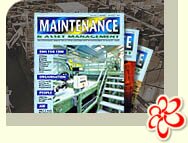| Conference Communication - Journals | |||||||||||||||||
|
Maintenance & Asset Management Journal "The International Journal for all Those Concerned with the Management of Physical Assets" The journal, published bi-monthly, provides: |
 |
||||||||||||||||
Use our enquiry form to request a complimentary copy of the journal for your perusal. Abstracts from all back issues of Maintenance & Asset Management Journal are available to order online. Click here to order your subscription to Maintenance & Asset Management Journal. |
|||||||||||||||||
|
|||||||||||||||||
|
To give you an idea of the themes behind each issue, we reproduce the Editor's Foreword on a regular basis. From the Editor's Desk December 2001 A prosperous New Year to all our readers, and may all your assets be better managed than ever. EditorJohn Harris Technical Advisor Anthony Kelly and John Harris have both researched and taught maintenance for many years and have undertaken extensive numbers of maintenance consultancy projects in the UK and abroad. They have also published numerous books and articles on maintenance management including:
|
|||||||||||||||||
|
Use Our Information and Enquiry Service Subscribers can make free use of the Journal's maintenance information centre. We are able to either answer enquiries from information held in our own maintenance library, or can put subscribers in contact with technical experts who we feel will be able to answer a particular query. Simply click here to get in touch with us. Alternatively, the Maintenance Noticeboard can be a beneficial way to find answers to your questions. |
|||||||||||||||||
|
|
|||||||||||||||||
| Conference Communication, Monks Hill, Tilford, Farnham, Surrey, GU10 2AJ, UK Tel: +44 (0) 1252 783111, Fax: +44 (0) 1252 783143, Email: |
|||||||||||||||||